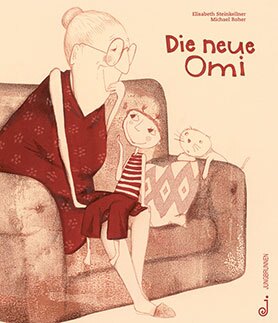Elisabeth SteinkellnerMichael Roher
Die neue Omi
[The new Granny]
- Jungbrunnen Verlag
- Vienna 2011
- ISBN 978-3-7026-5826-7
- 32 Pages
- 4 Suitable for age 5 and above
- Publisher’s contact details
Elisabeth Steinkellner
Die neue Omi
[The new Granny]
This book was showcased during the special focus on Spanish: Argentina (2009 - 2011).
Sample translations
Review
With “Die neue Omi,” author Elisabeth Steinkellner and illustrator Michael Roher have created a children’s book that sensitively addresses the difficult topic of aging and dementia. A warm-hearted and moving story about a changing, and at the same time loving relationship between grandmother and granddaughter, awaits the reader.
Little Fibi loves wild hair-dos and her Granny, too, although the latter cannot always make much of her granddaughter’s strange hairstyles, and therefore really prefers to pull a cap over Fibi’s head. But Granny has other things to offer – not only does she send postcards from her travels in distant lands, she also delights the entire family after her return with recipes for exotic dishes. The world is as it should be when Granny and Fibi go to feed the ducks together, until the day when everything changes. Suddenly, a new Granny is there. She can no longer travel and moves in with Fini’s family. Once there, she revels in memories of her past life which she shares with her granddaughter, while her gaze drifts off into the distance.
Instead of feeding breadcrumbs to the ducks, Fini’s grandmother now eats them herself. And the old lady has been doing other things lately that Fini also finds strange. For example, she turns on the hobs to warm herself up instead of cooking with them. Fini is therefore given the task of keeping an eye on her. She enjoys drinking hot chocolate with her new grandmother and telling her stories. But when her grandmother dozes off, she gets bored. Fini’s mother discovers the snoring grandmother under the kitchen table, and is angry with her daughter. But Fini feels unfairly treated and becomes angry herself: “Why should I look after Granny? Why me? She should take care of herself!” Next day, Agatha the care-giver comes to look after her grandmother. She helps her brush her teeth, bathe and get dressed. Fini looks on and her resentment gives way to the deep affection she feels for her grandmother. “You are a miracle!” she tells her new Granny, and helps her eat. Thus a new tie gradually emerges between Fini and her grandmother. The old, cosmopolitan Granny had taught her granddaughter that changes can be positive, but she never liked Fini’s crazy hair-dos. The new Granny cannot travel around the world and needs someone to look after her, but she likes her granddaughter’s chaotic tresses. And in the end, Fini can do her new Granny’s hair every Sunday morning.
“Die neue Omi” is a children’s book that has been designed with great sensitivity, one that succeeds in conveying the difficult topic of senile dementia gently and understandably. The problems that the change in Granny presents for the whole family are over in silence, but addressed openly instead. The book shows how parents and children can cope when older people are no longer who and what they used to be, and that taking responsibility for others is important - and not overburdening either children or parents is important as well.
Michael Roher’s calm and unobtrusive images in warm tones of red, that do full justice to the story’s emotional depth and win over the reader with their simple beauty, are skilfully attuned to the contents. The characters are delineated with gentle, soft lines. Even the rooms tell little stories thanks to Roher’s loving attention to detail. The grandmother’s apartment, depicted on the two double spreads at the beginning and end of the book, is a mirror of her old life. The framed family photos, the rug from India and the exotic mask on the wall bear witness to a many-sided and active woman. It is a look into the past, in a home in which Granny can live no longer. The overall design convinces through exciting details – there is something to discover on every page: from mice playing crossword puzzles to unusual postcard views from all over the world.
With “Die neue Omi,” Steinkellner and Roher have created a perceptive and empathic children’s book; a narrative about how relationships change and roles can be reversed. Adults become children again and children become little adults who take on responsibility for those who once looked after them. Some themes are difficult to express in words, but illustrated books like this one succeed.

Little Fibi loves wild hair-dos and her Granny, too, although the latter cannot always make much of her granddaughter’s strange hairstyles, and therefore really prefers to pull a cap over Fibi’s head. But Granny has other things to offer – not only does she send postcards from her travels in distant lands, she also delights the entire family after her return with recipes for exotic dishes. The world is as it should be when Granny and Fibi go to feed the ducks together, until the day when everything changes. Suddenly, a new Granny is there. She can no longer travel and moves in with Fini’s family. Once there, she revels in memories of her past life which she shares with her granddaughter, while her gaze drifts off into the distance.
Instead of feeding breadcrumbs to the ducks, Fini’s grandmother now eats them herself. And the old lady has been doing other things lately that Fini also finds strange. For example, she turns on the hobs to warm herself up instead of cooking with them. Fini is therefore given the task of keeping an eye on her. She enjoys drinking hot chocolate with her new grandmother and telling her stories. But when her grandmother dozes off, she gets bored. Fini’s mother discovers the snoring grandmother under the kitchen table, and is angry with her daughter. But Fini feels unfairly treated and becomes angry herself: “Why should I look after Granny? Why me? She should take care of herself!” Next day, Agatha the care-giver comes to look after her grandmother. She helps her brush her teeth, bathe and get dressed. Fini looks on and her resentment gives way to the deep affection she feels for her grandmother. “You are a miracle!” she tells her new Granny, and helps her eat. Thus a new tie gradually emerges between Fini and her grandmother. The old, cosmopolitan Granny had taught her granddaughter that changes can be positive, but she never liked Fini’s crazy hair-dos. The new Granny cannot travel around the world and needs someone to look after her, but she likes her granddaughter’s chaotic tresses. And in the end, Fini can do her new Granny’s hair every Sunday morning.
“Die neue Omi” is a children’s book that has been designed with great sensitivity, one that succeeds in conveying the difficult topic of senile dementia gently and understandably. The problems that the change in Granny presents for the whole family are over in silence, but addressed openly instead. The book shows how parents and children can cope when older people are no longer who and what they used to be, and that taking responsibility for others is important - and not overburdening either children or parents is important as well.
Michael Roher’s calm and unobtrusive images in warm tones of red, that do full justice to the story’s emotional depth and win over the reader with their simple beauty, are skilfully attuned to the contents. The characters are delineated with gentle, soft lines. Even the rooms tell little stories thanks to Roher’s loving attention to detail. The grandmother’s apartment, depicted on the two double spreads at the beginning and end of the book, is a mirror of her old life. The framed family photos, the rug from India and the exotic mask on the wall bear witness to a many-sided and active woman. It is a look into the past, in a home in which Granny can live no longer. The overall design convinces through exciting details – there is something to discover on every page: from mice playing crossword puzzles to unusual postcard views from all over the world.
With “Die neue Omi,” Steinkellner and Roher have created a perceptive and empathic children’s book; a narrative about how relationships change and roles can be reversed. Adults become children again and children become little adults who take on responsibility for those who once looked after them. Some themes are difficult to express in words, but illustrated books like this one succeed.
Translated by Edith C. Watts

By Andrea Müller
